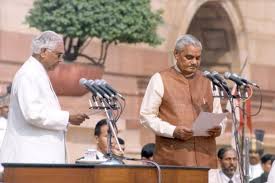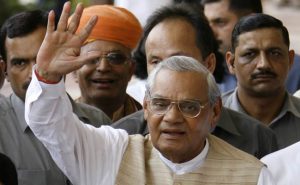Atal Bihari Vajpayee: Some Unexplored Stories – Part II
From solving Assam’s internal conflicts to his own party and movement’s opposition to free economic policies, Vajpayee had his work cut out for him.
Assam protests over illegal immigrants
 D uring the war of independence of Bangladesh, about a crore of refugees arrived in India. In due course of time, millions of illegal immigrants reached the Indian states of Assam and West Bengal. Many of the illicit immigrants became voters and rulers.
D uring the war of independence of Bangladesh, about a crore of refugees arrived in India. In due course of time, millions of illegal immigrants reached the Indian states of Assam and West Bengal. Many of the illicit immigrants became voters and rulers.
Reportedly, Vajpayee once said, “The Bangladesh Prime Minister, however, denied reports of any infiltration when I pointed out that illegal migrants become voters and then rulers.”
During his reign in 2001, he mooted an idea of issuing work permits to foreign nationals in the state. He said during the poll in 2004, “The foreigners are welcome as guests. But we will not welcome those who want to grab our land. India helped Bangladesh achieve independence. The Bangladeshis should remain happy inside the territory of their own country.”
Vajpayee said the Illegal Migrants (Determination by Tribunal) Act, 1983 had become in fructuous, as only 1,500 illegal migrants had been detected and deported from Assam since its enactment, while thousands of Bangladeshis had entered the state without a valid passport.
“It is alleged that Vajpayee gave an insinuating speech over immigrants that led to the Nellie massacre.”
Sangh Parivar opposes Economic Laissez-Faire
Under the NDA regime, Vajpayee had to go with earlier economic liberalisation policies and had to be soft over BJP’s traditional policies such as repeal of Article 370 and Uniform Civil Code. The hardcore sections of the old Jan Sangh were not happy with the regime and mooted a rebellious voice over the lack of concern for the old policies.
Balraj Madhok, once party president of BJS, wrote a letter to the RSS head to revive the old party to counter the regime. Other frontline organisations like Bharatiya Mazdoor Sangh opposed the economic laissez-faire policies of the regime.
Today, Modi goes in between the two divisions and balances the act of survival by maintaining public sympathy.
 Vajpayee’s Personal Life
Vajpayee’s Personal Life
As Vajpayee was not married, he was seen as a ‘lonely’ person. He was accompanied by a family of Kaul’s for a long time. One of the couple’s daughters was later adopted by him. Rajkumari Kaul, who studied with Vajpayee, said they loved each other but it did not end up in marriage because the Kauls were opposed to the proposal.
Several leaders like Subramanian Swamy and even Balraj Madhok stirred controversies by alleging that Vajpayee was an alcoholic and a womaniser. Balraj Madhok, it is said, had mentioned such incidents in his biography. He also did not spare supreme RSS leaders such as Golwalkar and Balasaheb Deoras for their confidence on Vajpayee. Though Madhok is credited for the party’s success in 1960s when it had widespread support and electoral victories, the situation across the country was not in favour of the ruling Congress either. It lost eight states to opposition parties.
“Vajpayee was a charismatic personality and great orator who was much more accepted than other leaders including his failed successor L K Advani, with the exception of Narendra Modi, whom he almost asked to quit following the Gujarat riots.”
Vajpayee was more of an urban, soft-hindutva, and was pluralistic in his approach. He was saffron ‘Nehruvian’ in short. But his legacy proved that he was right in his strategies that still aid the party in the electoral politics of the country. Whenever the Sangh’s hardline backfired, it was his balancing act that came to the fore. And it is this statesmanship that will continue to stay in good stead.
(This is the second and final part in a two-part series on AB Vajpayee’s some unexplored stories.)
